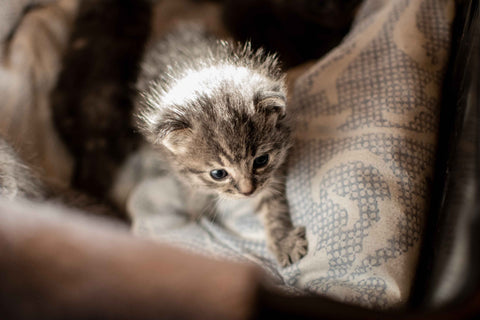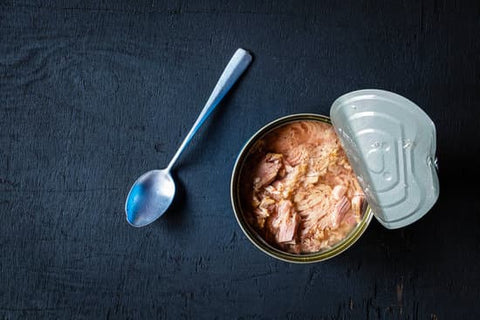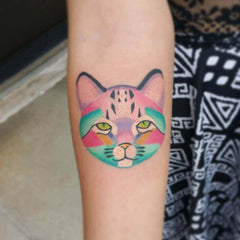| Content |
Eating fish is very natural to cats, there is common sense that almost all cats even go crazy over a can of tuna. Everywhere on social media network, the image of a cat enjoying a piece of fish is so familiar that we forget to check if giving them some leftover tuna in our daily meal is a good idea or not, we just do it. However, have you ever wondered, is tuna really good for cats? It is not an easy-peasy question that you and your feline friend may take time to answer.

Cats are strict carnivores, it means they need meat to survive, but before feeding them tuna on a regular basis we should take into consideration the benefits and harms which tuna may bring.
Let’s take a closer look at the benefits first:
Benefits Of Tuna For Cats:
1. Up-growth and development process:
Tuna is known as a high-quality protein source, animal-based protein plays an important role in cat diet as it helps for rebuilding and developing strong muscle and tissues. It also contains high lysine amino acid which builds a block of feline nutrition.
2. Coat and skin appearance:
Fatty fish like tuna contain a high amount of omega-3 fatty acids which are an essential part of a healthy diet for a cat. The specific omega-3 fatty acid that cats may benefit from is DHA (Docosahexaenoic acid), it contributes to give your cat a healthy shiny skin with less shedding, help to manage painful joint. DHA is good for the brain and eyes of the cat as well.

Omega-3 is an essential part of a healthy diet for a cat. Via Fussie Cat Premium Tuna Formula
3. Energy supply:
Together with Omega-3 fatty acids, Vitamin B complex and Thiamine in tuna maintain blood pressure and give a cat energy boost. You will own actively cheerful cats!
4. Vitamins and mineral diversity:
High levels of vitamin B6, B12, C, manganese, and potassium in tuna improve the cat’s immunity to prevent bacteria and pathogens. Additionally, blood circulation and red blood cell function of them will be strengthened by making use of iron, niacin, riboflavin, potassium found in tuna.
5. Good taste:
Tuna has an attractively strong smell to cats and there is no doubt about it, cats love the fishy smell. It motivates felines which loss appetite during anorexia phase

Disadvantage Of Tuna For Cats
Having said all of the above, generally, we have in our mind all the advantages of tuna towards cats, now it is time to play a fair game to talk about drawbacks of it.
1. Unsaturated Acids and Vitamin E problems
Tuna has large amounts of unsaturated fatty acids. Feeding your cats tuna as primary diet (especially red tuna) could lead to a lack of vitamin E consumption. Both potentially cause our felines a disease called yellow fat disease (or steatitic) because of fatty tissue inflammation.
2. Poisoning
High level of mercury contained in tuna is a serious threat to cat health that too much tuna in one time (or gradual) may appear mercury poisoning. One study conducted on 16 kittens (both male and female) fed with mercury-contaminated tuna on daily diet shows outward signs of neurological disturbances after the first 7 months. It may go worse to have severe syndromes such as poor body control, weakness, and seizures.

Some tuna contain mercury which can cause seizures
3. Contain Thiaminase (Which Is Seriously Damaged For Cats)
Some tuna types contain thiaminase, it is an enzyme which damage thiamine (vitamin B1). Vitamin B1 deficiency results in neurological symptoms (seizures, stupor, head tilt, ataxia, and coma).
4. Tuna Don't Have Taurine
Cats need dietary taurine, a vital nutrient to grow normally and healthily. Lack of taurine will cause blindness, heart problems, and reproductive problems in cats. And unfortunately, you can’t find it from tuna source!
Can I Feed My Cat With Raw Tuna?
Having gone through all positive and negative aspects of tuna, you need to be mindful of below highlights:
Raw tuna could not be served for your cats at any cost! Eating raw or undercooked tuna (and other fish) is not safe for cats because of Salmonella and E. coli bacteria. The scenario of an outdoor cat catching fish from a stream for his/her meal should not be applied to domesticated cats, it is too risky. You won’t expect the following symptoms (depression, dehydration, lack of appetite, fever, shock, vomiting, watery diarrhea) due to food poisoning for your felines, will you?

Do not feed your feline with raw tuna at any cost
Canned Tuna For Cats, Yes Or No?
So, canned tuna work in this case? The answer is yes, but be alert! The cooking/canning process destroys thiaminase so you are considering if it is fine to give the cats your tuna can? Check the ingredients first! If it is canned with salt and oil (commonly sunflower oil or olive oil), then it shouldn’t. Sodium found in salty broth causes dehydration and high blood pressure while extra oil causes diarrhea. Make sure it is made with only fish itself and water to form tuna juice, no added chemicals, no added seasoning purpose

Always check ingredients first before buying a canned tuna for your cat, do not buy if it has salt
What Type Of Tuna Should I Choose For Cats?
Choose tuna type low in mercury. Due to water pollution, research indicates that farm tuna contains a lower level of mercury than naturally caught fish. Chunk light tuna (such as Skipjack and Tongol) has mercury concentration less than large and long-living fish (such as Albacore or Bluefin tuna). And yes, it is quite complicated!
Is Tuna-Based Wet Food Okay?
Tuna-based in wet cat food can be secure. Nowadays, in order to satisfy our picky furry friends, commercial wet food which tailor-made for cats is produced with formulated balanced nutrients, first to ensure their healthy development, second to meet their appetite request with appealing fishy smell. In this way, cats can gain both benefits at the same time safely.
Do Not Abuse Tuna In Cat Meals
Tuna can become addictive to cats so try to diversify alternative treats for them. We all know focusing on one thing is not good and don’t wait till the time when they aggressively reject to eat anything else but tuna

If your cat eats too much tuna, they will become addicted to tunas and refuse eating anything else
Tuna Cannot Be Served For All Cats
Firstly, cats which have kidney problem must avoid it, a high level of phosphorous in tuna will increase the development of kidney problem. Secondly, cats with heart disease and diabetes should stay away from canned tuna as well, especially tuna in brine. Thirdly, cats with fish allergies must be in the red area.
To summarize, you can refer this 2 minutes video to have an overall image and answer by yourself how healthy tuna for your cats:
Suggested Products:
As mentioned, there are formulated tuna cat food which will not make the situation harder. Better yet, check the ingredients before buying. You may find a product recommendation as below
Fussie Cat Tuna With Smoked Tuna
In conclusion, tuna is good for cats in moderation, it is not harmful at all to give tuna for cats as an occasional treat, as long as you keep in mind the above notice. Never consider it as the main daily intake, otherwise, your felines have to suffer malnutrition and severe diseases in the long run. Half a spoon of tuna left from you in a can (no salt, no oil) is quite fine and make your friend feel joyful. If you have any question related to the topic or just your cat story, please don’t feel hesitate to comment and share below





